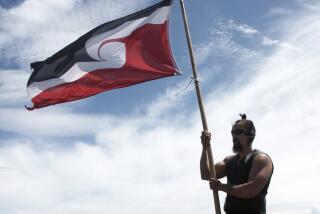Decorated Maori poet, New Zealand laureate
Hone Tuwhare, the first Maori poet to be published in English and one of New Zealand’s most celebrated verse writers, has died. He was 86.
Tuwhare died Wednesday at a home for the elderly in the southern New Zealand city of Dunedin. He had been in poor health for several years. The cause of death was not immediately released.
His work, spanning more than 40 years, was popular among poetry connoisseurs and general readers alike.
He was named New Zealand’s Te Mata poet laureate in 1999, won two Montana New Zealand book awards for poetry and was awarded honorary doctorates of literature by Auckland and Otago universities.
Born in 1922 to the Ng{amacronl}puhi tribe in the northern New Zealand town of Kaikohe, Tuwhare first began to write in 1939, while working as a boilermaker.
Tuwhare’s initial collection, “No Ordinary Sun” in 1964, was a passionate cry against nuclear weapons, penned in response to the destruction of Hiroshima in 1945 -- the first book of poetry by a Maori writer in English.
“No Ordinary Sun” features the lines “Tree let your arms fall: raise them not sharply in supplication to the bright enhaloed cloud. . . . [F]or this is no ordinary sun.”
Now in its 10th reprint, it remains one of the most widely read individual collections of poetry in New Zealand. It was crafted into an activists’ song against nuclear proliferation 20 years after its publication, according to the Maori Party.
Tuwhare also published at least 10 other volumes of poems and several plays.
He was passionate about Maori issues and from the 1970s became increasingly involved in Maori cultural and political initiatives.
The Oxford Companion to English Literature said Tuwhare’s poems were marked by their “assumption of easy vernacular familiarity with New Zealand readers.”
Much of their originality came from their Maori perspective, which was evident not only in their subject matter but also in “their direct lyrical response to landscape and seascape, their vivid evocation of Maori myths and images and their capacity for angry protest at the dispossession of Maori land and culture,” it noted.
Tuwhare’s survivors include three sons.
More to Read
Sign up for our Book Club newsletter
Get the latest news, events and more from the Los Angeles Times Book Club, and help us get L.A. reading and talking.
You may occasionally receive promotional content from the Los Angeles Times.









